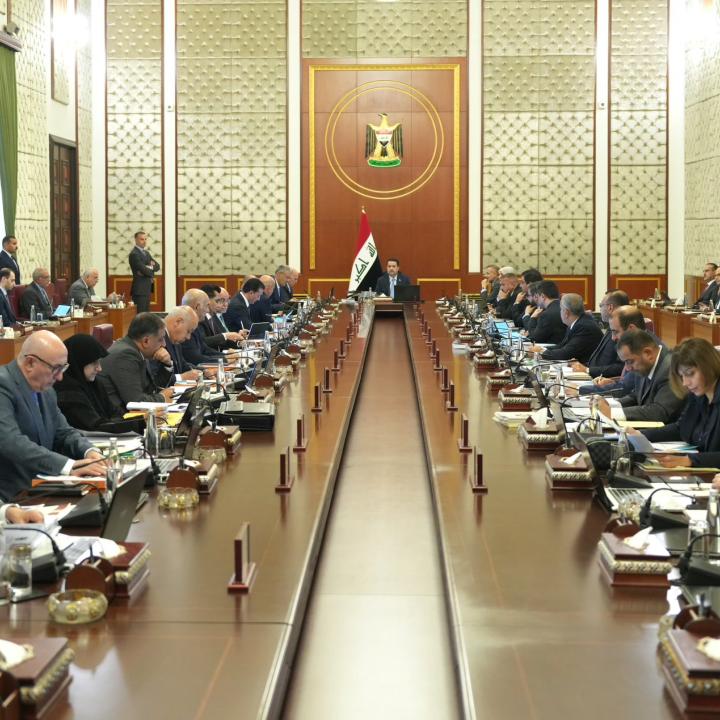
Extent of Terrorist and Militia Fuel Oil Diversion Exposed in Iraq

A mechanism for diverting Iraqi government oil to militias through non-operational factories was recently exposed, creating a panic shutdown of asphalt plants run by Iran-backed terrorists.
On July 15 and 22, the Iraqi cabinet’s Ministerial Energy Committee (MEC) held two sessions in which suspicious oil decisions marked “very urgent” were passed (see Figures 1-3, 5). Specifically, officials took sudden action to suspend the widespread diversion of government fuel oil to fake end-users owned or taxed by U.S.-designated terrorist groups such as Kataib Hezbollah and Asaib Ahl al-Haq.
The MEC, which is chaired by Prime Minister Mohammed Shia al-Sudani, likely took these steps because the scale of this terrorism threat financing channel was at imminent risk of exposure and international sanctions in the coming months. The first step came in early July (Figure 4), when an emergency stop was put on oil allocations to Basra, where diverted oil is most easily smuggled abroad.
The method by which terrorist militias diverted fuel has long been understood and was fully abetted by the Sudani government from its first days in office. Namely, the Oil Ministry, the Ministry of Industry and Minerals, and the Prime Minister’s National Operations Center (PM-NOC) would allocate quantities of government-owned fuel oil to Iraqi asphalt factories at heavily subsidized rates. The documents authorizing these allocations would greatly overstate the operating capacity (and thus the fuel needs) of these factories, enabling most (or in some cases all) of the fuel oil to be diverted to illegal export. With Iraqi government complicity, the diverted fuel oil was mislabeled as flancoat or other exportable commodities. As flancoat is a solid material delivered in barrels, the exports were very obviously something else because they arrived in road tankers that carry liquids.
Fuel oil smuggling had been constrained by the previous government of Mustafa al-Kadhimi. In 2020-21, the subsidized price of fuel oil to factories was raised from $70 per metric ton to $220 per metric ton (with militias blocking a 2021 government effort to raise it even higher, to $375 per ton). Such oil could be sold outside Iraq for at least $500 per ton, so the higher the sale price, the lower the smuggling margins. The previous government also surveyed the real capacity of asphalt plants and drastically reduced their fuel oil allocation to match these levels (often below 20 percent).
Under Sudani, the reverse occurred: the subsidized price of fuel oil was lowered back to $100-150 per ton, and the allocation of fuel oil to factories increased well beyond their proven needs. Six completely non-operational plants run by U.S.-designated terrorist groups saw their allocations returned. Sudani's government also rapidly expanded the licensing of fake asphalt plants, including thirty-seven new projects (versus one under the prior government), a near-doubling of the industry. As the current MEC and Oil Ministry decisions indicate, around twenty-six factories (including many of the post-2022 additions) have neither the output nor the workforce to justify the allocations.
This summer, the Sudani government has sought to hastily distance itself from the diversion mechanism, though the PM-NOC's leading role in fuel oil allocations is difficult to conceal. The MEC decrees ordered an immediate investigation into the real capacity of the asphalt plants and reduced allocations to 60 percent of capacity until the review is completed, while also increasing the price of subsidized fuel oil to $369 per ton. Within ninety days (i.e., by late November, after the U.S. elections) the MEC will return its verdicts on which plants should remain open.
Foreign officials will need to keep monitoring this situation to ensure that U.S.-designated terrorist groups no longer profit from subsidized and diverted fuel oil. A similar scam that ended in 2019 netted around $250 million per year; today, the expanded smuggling system probably nets more than $80 million per month ($960 million per year) based on rough calculations of volumes and pricing.
Officials will also need to verify whether any asphalt plants are actually shut down. As noted above, the July Oil Ministry communique (Figure 4) showed that twenty-six of fifty-five private-sector asphalt factories had no legitimate claim to receive fuel oil allocations. The language in the MEC decrees leaves plenty of room for evasion, and the factory owners (and associated terrorist and militia groups) are already preparing to appeal the decisions.
Attention should also be focused on what happens to the excess fuel oil going forward. Will it be funneled to plants owned by the State Company for Mineral Industries that are equally undeserving of such allocations due to their low productivity levels? And if so, will militias simply divert it from there instead?
Finally, authorities should watch out for other channels being activated to simply steal the newly available fuel oil through paperwork fraud and export it via Turkey, Iran, or Syria using tanker trucks.




